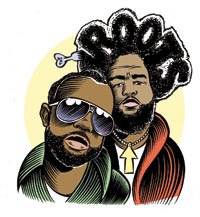WHY THE ROOTS WILL ALWAYS BE PHILLY
A friend of mine has a funny I-met-the-Roots-and-made-an-ass-of-myself story. This friend, for obvious reasons, shall remain nameless, but for sheer entertainment value, let’s refer to him hereafter as Horsecock.
Around the release of 2002’s wonderfully artsy-fartsy Phrenology, good ol’ Horsecock and his girl went to see the Roots perform at Indre Studios. Joining the Roots for said performance was one Cody ChesnuTT, the dirty South rubber-band man who lent his Smokey Robinson-like pipes to the single “The Seed (2.0).”
Later Horsecock and his girl ventured up to an impromptu VIP after-party on Indre’s roof deck, and promptly struck up a conversation with ChesnuTT. Understand that Horsecock is/was a longtime Roots fan, but at the time he was completely taken with ChesnuTT’s The Headphone Masterpiece, calling it “the black Bee Thousand,” a reference to Guided By Voices’ landmark lo-fi breakthrough album.
Another after-party guest approached, thrust out his hand and introduced himself as Tariq. Horsecock responded with something along the lines of, “Yeah, yeah, yeah, nice to meet you Tariq, but I’m talking to my new pal Cody ChesnuTT. He’s down with the Roots, yo.”
Horsecock’s girl elbowed him in the ribs and, out of the corner of her mouth, reminded him that Tariq was also known as Black Thought, the Roots’ frontman and MC. D’oh!
Horsecock tried to cover with something along the lines of, “Oh, Ta-reek … sure, sure, love your flow. Love it.” But by then the damage was done, and Black Thought went off in search of the less clueless in attendance.
I mention this for two reasons. First, I just like seeing the word Horsecock in print. Second, it’s indicative of why the Roots-despite the Grammy, the globe-trotting acclaim, the killa-dilla live rep and the white critical mass approval earned over the course of six diligently diverse and diversely innovative albums-have never been sprung from commercial death row, a life sentence meted out for the crime of failing to shake the alt-rap tag that’s stuck to them like flypaper since their days at the Philadelphia High School for the Creative and Performing Arts.
The Roots have great taste; the buying public wants rap that tastes great. Their problem is that the drummer is more iconic than the frontman. This isn’t entirely the fault of Black Thought: As an MC his formidable skills should theoretically pay the bills. He’s just not enough of a cartoon: no gold tooth, no Courvoisier to pass, no big clock hanging around his neck, no bullet holes, no body count, no body armor.
Nicely anthologized in the excellent recently released Home Grown!: The Beginners Guide to Understanding the Roots volumes one and two, the sum and essence of Black Thought’s words mirror Jules’ famous imprecation in Pulp Fiction: “The path of the righteous man is beset on all sides by the inequities of the selfish and the tyranny of evil men. Blessed is he who, in the name of charity and goodwill, shepherds the weak through the valley of the darkness, for he is truly his brother’s keeper and the finder of lost children. And I will strike down upon thee with great vengeance and furious anger those who would attempt to poison and destroy my brothers.”
Amen, right? Still, it’s hard to dress those vows up in bling and boo-tay, gunplay and G-units, and sell it to horny 14-year-old suburban white boys with appetites for destruction. And to their credit, the Roots have never even tried. History will be kind to them, even if radio isn’t, because the Roots always did the right thing.

